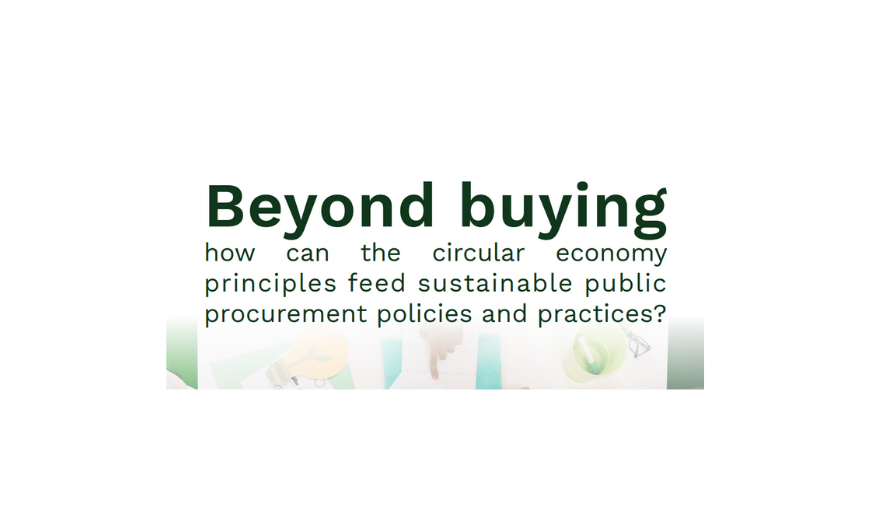Think Globally, Act locally: A new guide to sustainable procurement for local authorities
2021-07-22

New report outlines how municipalities can integrate the circular economy into their public procurement practices.
Where do local governments actually buy things?
Somewhere between commissioning the building of a new sports centre and it becoming a reality, the local authorities had to spend a lot of money. From the sports equipment and the building materials, to the tea and coffee and food for the meetings to plan it, to the chairs stacked up at the side of the room.
Public procurement – the process local authorities use to purchase goods and services – accounts for a staggering 14% of the EU’s GDP. In a time when our use of raw materials is outstripping the Earth’s resources faster each year, every sector must transition to more sustainable practices to reduce waste and build a more circular economy.
With this in mind, Bremen, the 2011 German Fair Trade Capital, commissioned the new report ‘Beyond Buying: how can the circular economy principles feed sustainable public procurement policies and practices?’ to outline how municipalities can include circular economy principles into their procurement policies and practices. The report also makes policy recommendations to support these efforts and mainstream sustainability across the procurement process.
Introducing the circular economy
The circular economy – an economic system that doesn’t exceed the natural resources of the planet and guarantees that nobody goes without the essentials to survive – is a useful approach for public buyers to adopt a more comprehensive definition of sustainable procurement.
Legislation at EU level has already laid the groundwork for mainstreaming circularity. In the EU’s 2020 Circular Economy Action Plan, the EU commits to ‘minimum mandatory green public procurement (GPP) criteria and targets in sectoral legislation’. Rather than just checking off sustainability criteria at the point of purchase, a circular procurement process would “start when procurers define their needs and should finish when their products are reused or recycled” (according to the EU’s own circular economy platform).
This means a new approach to procurement, one that first evaluates the way to satisfy the needs of the buyer while using the fewest number of resources – such as by reusing and recycling previous materials as many times as possible.
Public procurement as a tool for sustainable development
The 2030 Agenda and the Sustainable Development Goals explicitly name the importance of sustainable procurement in contributing to sustainable consumption and production patterns.
Local authorities must seize the opportunity to harness procurement as a tool for positive change. The urgent need to tackle overconsumption of natural resources reflect the need to treat all departments as related: working with sustainable businesses, environmental and social departments will develop holistic practices that work with people and planet.
How to make circular and fair procurement a reality
To illustrate the potential for sustainable procurement, the report offers the examples of four towns that have pioneered circularity in their own practices: Aalborg in Denmark; Ghent in Belgium; Ludwigsburg in Germany; and Malmö in Sweden.
Using these case studies and previous research, the report lays out a detailed guide for how local authorities can create their own circular procurement strategy: from assessing the need for a certain product to creating long-lasting relationships with suppliers.
However, to mainstream circular procurement, policymakers at the local and national level must address several barriers. Circularity isn’t a mandatory part of procurement criteria – which currently include sustainability regulations in a loose way – which currently treat ‘sustainable’ and there’s also a significant skills gap in the ability of local authorities to integrate circular economy practices and develop new relationships with the private sector.
The EU plans to make criteria for circularity, fairness, and sustainability mandatory in food procurement – but this must become the rule for all sectors. The EU should also offer training to local procurers and policy-makers to close the skills gap and promote the transformation of the 2014 EU Directive on Public Procurement into national legislation.
The groundwork for sustainable and circular procurement has been laid. Now is the time for local policymakers and national legislation to work together to pioneer circular practices that will serve people and the planet for a just and green future.
You can download the full report in English or in German.
For questions, please contact Alice Sinigaglia, sinigaglia[at]fairtrade-advocacy.org





















